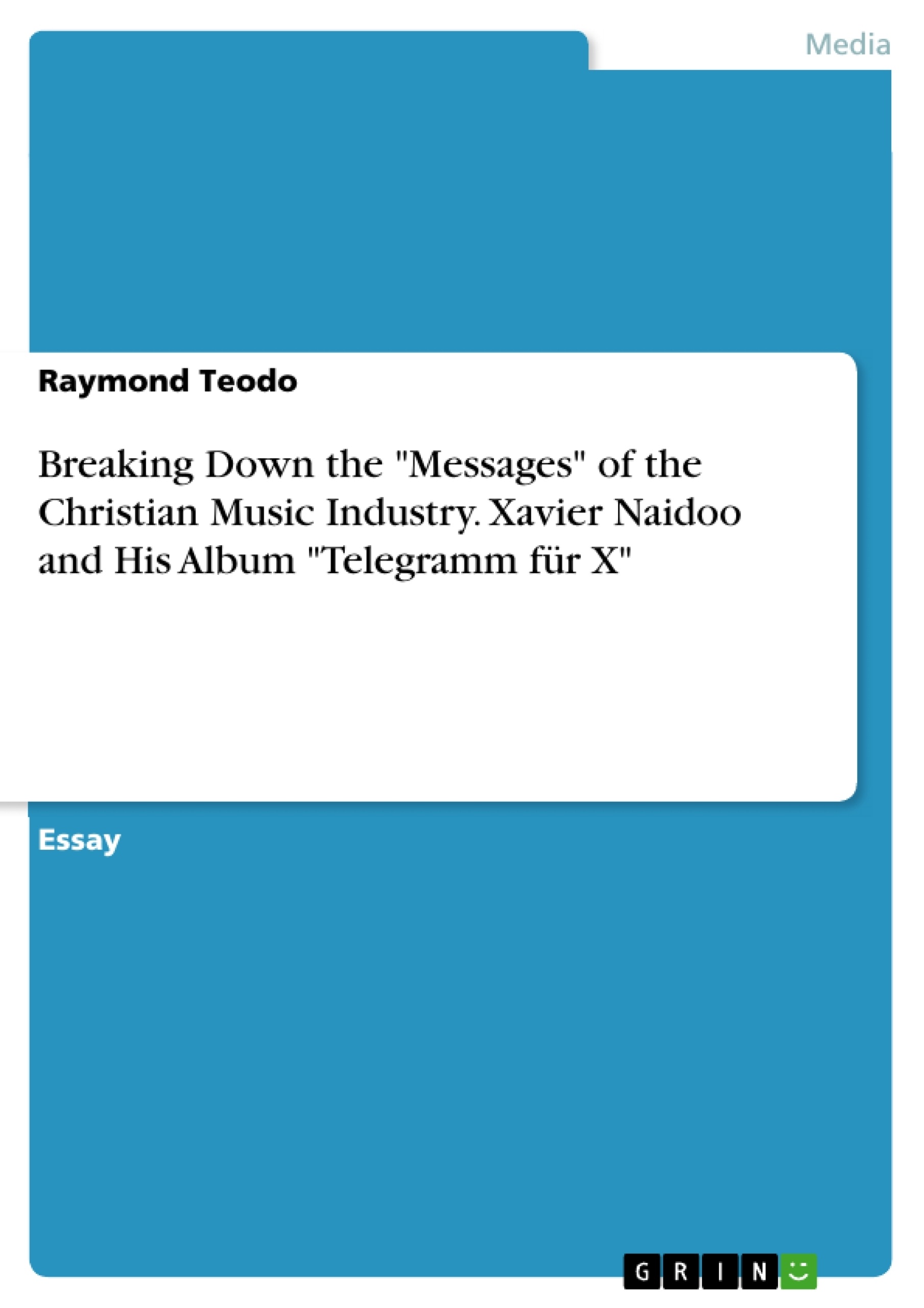Contemporary Christian music has always had its niche in popular music culture. This essay discusses the politics behind the Christian Music Industry in comparison with the mainstream Music Industry, using German hip-hop artist Xavier Naidoo and his album "Telegramm für X" as an example of this discussion in motion. The genre is arguably the most scrutinised in terms of quality and content, particularly when discussing artists' public image in concurrence with the messages they are producing in their music.
Consequently, the essay details the struggles the Christian Music Industry has in competing with mainstream competition, as well as what techniques contemporary Christian artists have had to employ in order for their music to attract a fan base. In short, it brings to the reader's attention the sort of lengths contemporary Christian artists must undertake in order to break into the mainstream and become recognised.
Inhaltsverzeichnis (Table of Contents)
- Introduction
- Biography
- Telegramm für X - The Religious, Social, and Political "Messages" of Xavier Naidoo's Songs
- Contemporary Christian Music and the Christian Music Industry
- Arguments and Criticisms of the Industry
- Conclusion
Zielsetzung und Themenschwerpunkte (Objectives and Key Themes)
This essay aims to explore the interplay between contemporary Christian music, the Christian music industry, and the promotion of religious messages to a wider audience. It uses the example of German artist Xavier Naidoo to demonstrate how Christian musicians integrate religious themes and secular music styles.
- The motivations and strategies of Christian artists in the industry
- The influence of secular music styles on Christian music
- The interpretation of "messages" within contemporary Christian music
- The historical development and growth of the Christian music industry
- The social and political dimensions of Christian music
Zusammenfassung der Kapitel (Chapter Summaries)
- Introduction: This chapter introduces the concept of "messages" within the Christian music industry and explores the motivations and challenges faced by Christian musicians in their engagement with both the Christian and secular music worlds. It also introduces Xavier Naidoo as a key example for the essay's analysis.
- Biography: This chapter provides biographical details of Xavier Naidoo, outlining his musical journey, personal experiences with racism and prejudice, and his "conversion" experience that motivated him to use music to promote his faith. It also discusses his musical style and his influence on the Christian music industry.
- Telegramm für X – The Religious, Social, and Political "Messages" of Xavier Naidoo's Songs: This chapter focuses on Naidoo's 2005 album, Telegramm für X, as a case study to illustrate how he combines secular music styles with religious themes in his music. It analyzes specific songs, highlighting their biblical references, social and political commentary, and the ways in which they convey Naidoo's religious beliefs.
- Contemporary Christian Music and the Christian Music Industry: This chapter examines the historical development of contemporary Christian music and the Christian music industry, tracing its origins and growth in both England and the United States. It explores the evolution of the genre, its increasing popularity, and its adoption of diverse music styles to reach a wider audience.
Schlüsselwörter (Keywords)
This essay focuses on key concepts such as contemporary Christian music, the Christian music industry, religious messages, secular music styles, artist motivations, social and political commentary, and the integration of religious themes within secular music. It also examines the influence of figures like Xavier Naidoo and the historical development of Christian music.
Frequently Asked Questions
How does Xavier Naidoo integrate religious messages into his music?
Naidoo combines secular music styles like hip-hop and soul with biblical references, social commentary, and personal faith experiences.
What is the significance of the album "Telegramm für X"?
The album serves as a case study for how contemporary Christian artists can reach a mainstream audience while delivering religious and political messages.
What challenges does the Christian Music Industry face?
The industry struggles to compete with mainstream quality standards and often faces scrutiny regarding the balance between artistic expression and religious content.
How has contemporary Christian music evolved historically?
It originated as a niche genre in the UK and US and has grown by adopting diverse popular music styles to attract a broader, often younger, fan base.
Why is public image important for artists like Xavier Naidoo?
An artist's public image must align with the "messages" they produce to maintain credibility within both religious and mainstream music circles.
- Arbeit zitieren
- Raymond Teodo (Autor:in), 2009, Breaking Down the "Messages" of the Christian Music Industry. Xavier Naidoo and His Album "Telegramm für X", München, GRIN Verlag, https://www.grin.com/document/966065



